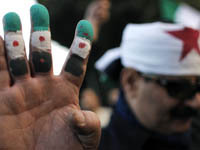The West invents new opposition for Syria
Washington decided that the opposition in Syria represented by the Syrian National Council (SNC) has exhausted itself. The West began implementing Kuwait reorganization plan to overthrow Bashar al-Assad. A new organization, the Syrian National Initiative, has been established. Yet again, Russia found itself in the trap of vague wording, this time, the Geneva agreements on Syria.
Washington got disappointed in the Syrian National Council (SNC) based in Turkey as it was unable to unite the internal and external opposition in the struggle against the government of Bashar al-Assad. "We've made it clear that the SNC can no longer be viewed as the visible leader of the opposition," U.S. Secretary of State Hillary Clinton said. The real disappointment lies in the inability of SNC management to take control over the so-called Free Syrian Army (FSA), that is, militant groups fighting in Syria. SNC's first leader was Shaliun Burhan who graduated from a University in Paris and called himself a "secular intellectual." His successor is Abdel Basset Seida, a Swedish citizen and a Kurd who immediately proved to be a follower of the U.S. orders.

How these inept and non-influential politicians could find a common language with the FSA militants who recognize the spiritual authority of Sheikh Adnan al-Arouri, Syrian Salafi leader? The Sheikh calls to overthrow and kill Bashar al-Assad not for political reasons, but only because he is an Alawite. Needless to say that all the commanders of the FSA are Sunnis, and its program suggests putting an end to the secular regime established by the party "Baath" and replacing it with a purely Wahhabi Sunni confessional regime. Recently, FSA militants became notoriously known for the videotaped atrocities against government soldiers.
The West has seen in Benghazi what the Salafis are capable of and how they would rule in post-Assad Syria. A decision was made to try to find a more influential leader and make a bet on less radical forces. The plan, developed by Qatar, was launched in the capital Doha on Sunday, November 4. It suggests the establishment of a new organization, the Syrian National Initiative (SNI). The main objectives of the new leadership of the Syrian opposition will be, according to France Press, a coalition to fight the Assad government, cooperation with the international community and coordination of efforts on the use of aid from other countries. SNC is allocated only 15 out of 50 seats in the "government in exile".
SNI is likely to be headed by a former member of the National Council (Parliament of Syria), 66-year-old "dissident" Riad Seif who has been struggling with cancer for many years. In early summer, he fled Syria and spent a few weeks in Germany undergoing medical treatment. Now his condition has improved and he has agreed to lead the new association. The Western media named the former prime minister of Syria Riad Hijab, who also fled in August, among the leaders and initiators, along with a founder and leader of the Syrian "Muslim Brotherhood" Ali Sadreddine Al-Bayanoun and a Syrian philosopher and a critic of religious ideology Sadiq Jalal Al-Azm. Many religious leaders, including the Alawites and other groups, including Kurdish political leaders, also joined the initiative.
SNC leaders initially dismissed the Doha plan, calling it an attempt to undermine the Syrian revolution, but then compromised under pressure and agreed to participate in the SNI, stipulating that they would fight to increase their influence. In an attempt to showcase the extent of their influence, on Saturday, November 3, SNC organized an attack on an air force base in northern Syria. Western analysts believe that the success of the new initiative will depend on whether Seif can resist pressure from the SNC and reach consensus on how to respond to international initiatives. If the SNC gains majority, Seif's initiative may be doomed to failure.
It appears, however, that this is not the issue, regardless of the outcome. Terrorist attacks in Syria are not organized by the "Brotherhood" but by irreconcilable Salafis led by Qatar. After the defeat of al-Assad they will change the game. "The Qataris have played their cards close to their chest and it's not clear they want the same things as us," British Foreign Secretary John Wilkes told the Guardian. Qatar's next goal is obvious - to shift the conflict into a new phase of confrontation in order to supply the opposition with heavy weapons. Seif said that SNI will help to establish the supply chain of anti-tank and anti-aircraft missiles to rebels and decide the outcome of this battle.
According to Russian diplomats, an initiative of Qatar, the U.S., Britain and France contradicts the Geneva Agreement on Syria that calls on the warring parties to sit down at the negotiating table. The official representative of the Russian Foreign Ministry Alexander Lukashevich said that the American initiative to form the so-called "opposition Syrian government in exile" encourages the opposition to continue its efforts to overthrow the regime of Bashar al-Assad, and to abandon the attempts to find other ways of settlement.
French Foreign Minister Laurent Fabius said that for him the agreement reached at the meeting on Syria in Geneva meant the end of Assad's rule because it involved "the creation of a transitional government." For the Russian Foreign Minister Sergei Lavrov the Geneva Agreement does not mean exclusion of Assad from the political process. "The document does not imply this," Lavrov said. History repeats itself. Does this mean that the Russian authorities did not learn anything from distortion of UNSCR 1973 on Libya by the West? The only hope is that the second time it will be repeated as farce.
Lyuba Lulko
Pravda.Ru
Subscribe to Pravda.Ru Telegram channel, Facebook, RSS!


